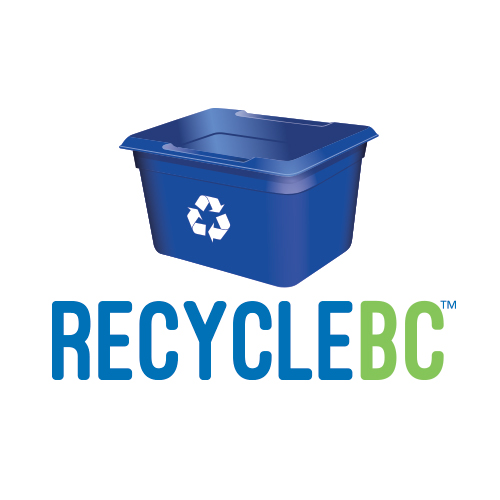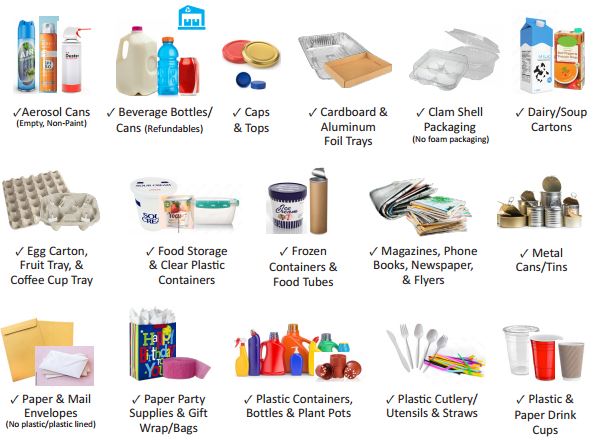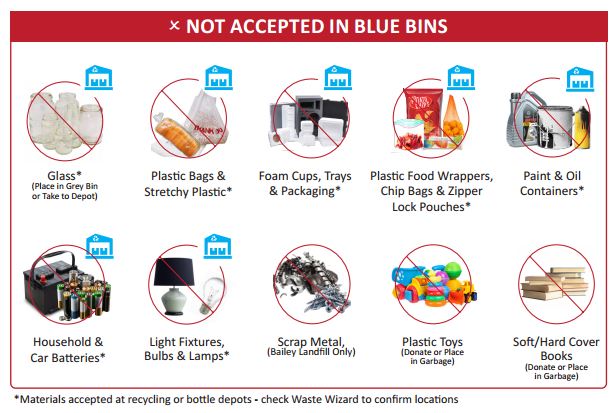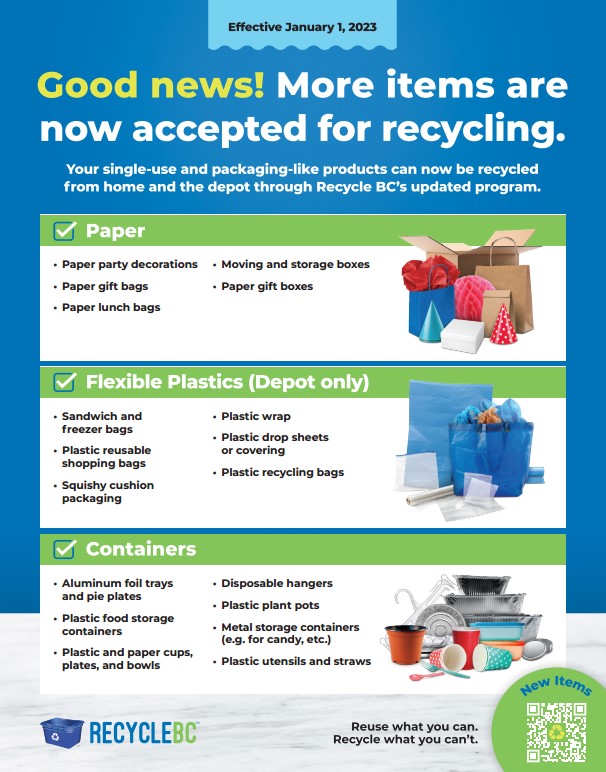Curbside Recycling

Recycling in Chilliwack
Chilliwack is part of the Provincial Stewardship Program for packaging and paper products administered by Recycle BC. Recycle BC and the Province set the rules and contamination thresholds for our recycling program and Recycle BC has requested that the recycling crews increase their efforts to tag and leave non-recycling materials. Once contaminants are removed, recycling can be placed back out for collection the following week.

NEW! Curbside Recycling Star Program
Do you want to be a Recycling SUPERSTAR? You could have a chance to win a $25 gift card!
We are launching a new Curbside Recycling Star Program to celebrate residents who help reduce contamination in the recycling bins. Learn how you can become a Recycling SUPERSTAR!
What goes in Curbside Recycling?
Below is a list of materials accepted for curbside recycling.

Items not accepted in Curbside Recycling
Too much contamination in recycling lowers the potential for materials to be recycled into high-quality products. Most items below can be recycled at the local depots indicated with the depot icon below. Different depots accept different items - use Waste Wizard or call the depot directly to confirm
![]()
Please visit our Recycling Depots and Waste Facilities page.

Curbside Recycling Tips
- Empty and rinse containers – food waste contaminates recyclables.
- Remove caps and lids from containers and place them loose in the recycling bin. No need to remove labels.
- Flatten and cut cardboard to max 1.25/4ft length, place in recycling container or place stacked and tied beside/under container at the curb.
- Single use recycling bags (e.g. blue bags) have been phased out since 2018. Other recyclables placed in bags will not be collected.
- Foam containers and packaging, plastic bags, overwrap, and other flexible plastic are not accepted at curbside but can be brought to the depots for recycling.
Recycling Container Information Requirements
For information regarding recycling container and limit requirements please visit our Container Requirements Information page.
Depot Recycling and Locations
A wide variety of residential items are accepted for free recycling at the depots. For locations, hours of operation and accepted items, please visit our Recycling Depots and Waste Facilities page.
New Items accepted for Recycling (Effective January 1, 2023)
Starting January 1, 2023 more items are accepted for recycling!
Your single-use and packaging-like products can now be recycled from home and depot through Recycle BC's updated program. Items such as paper party decorations, plastic food containers and plastic utensils/straws are now accepted for curbside recycling. For more information please visit Recycle BC New Items.

Who is Recycle BC and where does my Recycling go?
Q1: How does the Recycle BC Program affect me?
In Chilliwack, like many BC communities, the municipal government provides packaging and paper recycling services to residents through our curbside collection program with financial support from Recycle BC. Recycle BC receives funding from the producers of packaging and paper, which it uses to support collection programs and cover any costs of processing and marketing the collected materials. Recycle BC uses a consistent material list for the province, meaning the same materials are accepted everywhere Recycle BC operates. Find the full material list What Can I Recycle? » Recycle BC - Making a difference together.
Q2: Where does the plastic packaging (hard plastic containers) in BC go?
After being collected curbside these products are turned into plastic pellets to then be made into more plastic containers and products such as cleaning product containers, garden nursery pots, food containers etc. Did you know that 98% of plastic collected by Recycle BC, stays in BC! Plastics recycled through Recycle BC are processed by a local company (Merlin Plastics) into products that can be reused. Learn more about what happens to your recycling here: https://youtu.be/018fw3HbJ4c
Q3: Is collected plastic processed in BC?
Yes! Recycle BC work’s primarily with a local BC recycling end market, who process the rigid plastic containers and soft plastic packaging we collect. They receive sorted plastic grades and convert them into raw materials to be sold to customers who use them to manufacture new packaging and products. Recycle BC works together with its post-collection partners to manage all collected plastic responsibly.
Q4: What happens to metal cans and what metals is ok for blue bins?
They get recycled in North America, and processed into sheet metal which can be used for products or packaging. Please remember only metal containers from food and personal hygiene products may be placed in your curbside blue bin. Other scrap metal does not belong in the blue bin, but can be disposed of at the Bailey Landfill, and free disposal is offered in the months of April and October! Use our Waste Wizard to look up responsible recycling/disposal options for various items!
Q5: What is a circular economy and what does that mean for recycling?
Circular economy essentially means making sure products and resources that enter into the waste stream are reused, recycled, and reinvested into new products to prevent waste from being created (Recycle BC). Learn more about circular economy, and how that relates to end markets for recycling here: https://www.youtube.com/watch?v=ZJbL3ceT-HM
Q6: Is It true that over 90% of collected material is managed by Recycling?
Yes! After the materials are sorted, they are sold to end markets as a commodity. In 2020, only 6% of the collected material was too contaminated to recycle and had to be managed via disposal (Recycle BC). Here is some additional information: https://youtu.be/6k-tnM6icSA Also: Recycling Myths, Debunked » Recycle BC - Making a difference together.
Q7: Does Recycling more help keep waste out of our oceans?
Yes! Responsible plastic management provides social, economic and environmental benefits, allowing plastics to be used to make new products and packaging, contributing to a circular economy. Together with their service partner, Resource Recovery Alliance, Recycle BC endorses the New Plastics Economy Global Commitment’s common vision of a circular economy for plastics, where plastics never become waste.
Q8: What do the different recycle symbols mean?
These numbers are not for telling you which bin to put it in. Rather the numbers on the bottom of the product indicate what type of plastic was used to make it, also known as the resin identification code. Resin codes don’t indicate whether a plastic is recyclable through Recycle BC’s program. For acceptable materials look here: What Can I Recycle? » Recycle BC - Making a difference together. Or to sort out where stuff goes use the City’s Waste Wizard! Recycling, Compostables, & Garbage - City of Chilliwack
Other Frequently asked Questions
Q1. Why can't I place plastic bags/overwrap, styrofoam or other flexible plastic packaging with my other curbside mixed recycling?
Recycle BC requires these materials to be separated from the other curbside recyclables to increase processing efficiency because they can break easily, get tangled in machinery, and are more difficult to sort. Keeping certain materials separate also allows them to be recycled to the highest possible use.
The City may incur financial penalties through RecycleBC if these materials are found to be mixed in with curbside recyclables.
Plastic bags and styrofoam can be dropped off at Recycling/Bottle Depots free of charge. Other flexible plastic packaging is accepted at the Bottle Depots and London Drugs. Glass bottles and jars may be recycled at the curb in a separate Grey Bin.
Q2. Why were recycling bags (blue bags/clear bags) phased out in 2018?
The provincial recycling program, Recycle BC, required the blue bags/clear bags used for recycling to be phased out in 2018 because reusable containers are more environmentally friendly (create less waste) and bags negatively impact the recycling process by getting tangled in the sorting equipment.
Q3. How can I prepare shredded paper for recycling?
Shredded paper is accepted in a paper box placed beside the recycling container and not in blue bags. The plastic bags cause issues at the sorting facility as they get tangled in machinery.
Q4. Who is responsible for cleaning litter created by curbside materials?
If litter is created by the container tipping over, wildlife or wind prior to collection, it is the resident’s responsibility to ensure that the material is cleaned up. If litter is created during collection, it is the collection contractor’s responsibility to clean up the spill.
Other Recycling Resources
Recycling Council of British Columbia
When B.C. residents and businesses have questions about how to handle end-of-life materials, RCBC provide information about the options available through the Recycling Hotline and the online Recyclepedia. Each year, their Information Services staff answer more than 200,000 questions about pollution prevention, waste reduction and recycling from across B.C. For more information please visit Recycling Council of British Columbia (rcbc.ca).
Provincial Initiatives and Product Stewardship
Product Stewardship or Extended Producer Responsibility is the concept that those who produce, sell or use a product should take responsibility for the economic, environmental and health impacts of that product. This responsibility extends throughout the entire life cycle of the product.
A number of products are regulated for recycling in British Columbia, with local free recycling options.
For more information, visit the Provincial Initiatives and Product Stewardship page.
Recycling in FVRD
Watch this video to discover how items taken to the recycling depot or placed in your blue bin are transformed into new products.
| Attachments | |||
| Description | Date | File Size | |
| Curbside & Depot Recycling List - 2023 | 2023-09-12 | 3.30MB | |
| Curbside Sorting Guide - 2025 | 2023-09-05 | 6.44MB | |
| Other Flexible Plastic Packaging Photo Examples | 2025-07-08 | 1.92MB | |
| Quick Reference Guide - 2025 | 2025-03-03 | 431KB | |
| Recycle BC - New Materials Accepted 2023 | 2023-01-04 | 1.42MB | |
